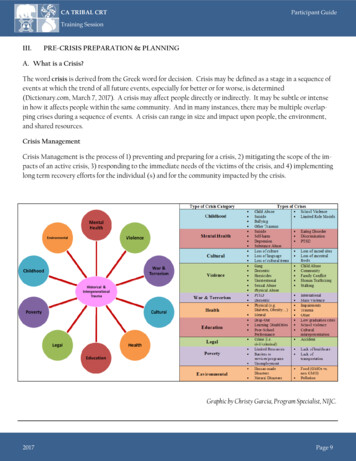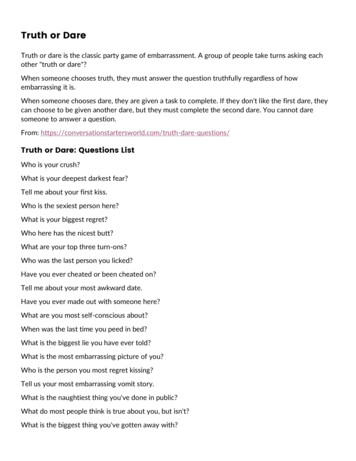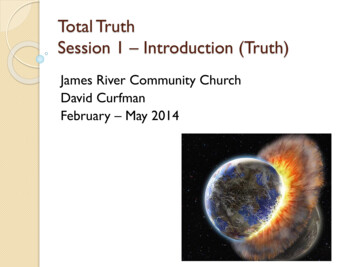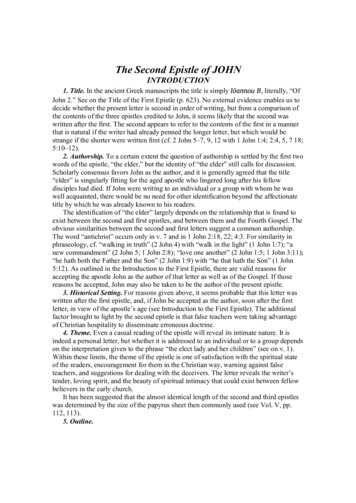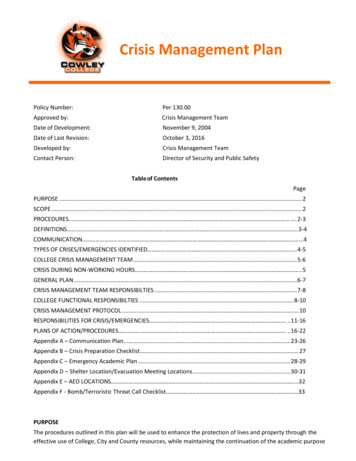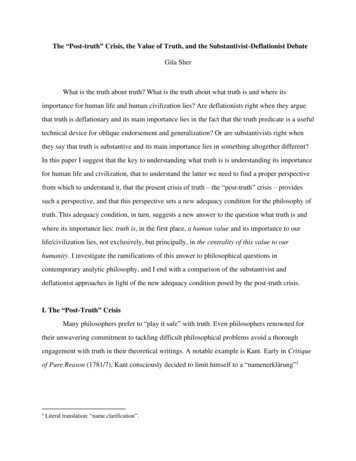
Transcription
The “Post-truth” Crisis, the Value of Truth, and the Substantivist-Deflationist DebateGila SherWhat is the truth about truth? What is the truth about what truth is and where itsimportance for human life and human civilization lies? Are deflationists right when they arguethat truth is deflationary and its main importance lies in the fact that the truth predicate is a usefultechnical device for oblique endorsement and generalization? Or are substantivists right whenthey say that truth is substantive and its main importance lies in something altogether different?In this paper I suggest that the key to understanding what truth is is understanding its importancefor human life and civilization, that to understand the latter we need to find a proper perspectivefrom which to understand it, that the present crisis of truth ‒ the “post-truth” crisis ‒ providessuch a perspective, and that this perspective sets a new adequacy condition for the philosophy oftruth. This adequacy condition, in turn, suggests a new answer to the question what truth is andwhere its importance lies: truth is, in the first place, a human value and its importance to ourlife/civilization lies, not exclusively, but principally, in the centrality of this value to ourhumanity. I investigate the ramifications of this answer to philosophical questions incontemporary analytic philosophy, and I end with a comparison of the substantivist anddeflationist approaches in light of the new adequacy condition posed by the post-truth crisis.I. The “Post-Truth” CrisisMany philosophers prefer to “play it safe” with truth. Even philosophers renowned fortheir unwavering commitment to tackling difficult philosophical problems avoid a thoroughengagement with truth in their theoretical writings. A notable example is Kant. Early in Critiqueof Pure Reason (1781/7), Kant consciously decided to limit himself to a “namenerklärung”11Literal translation: “name clarification”.
2of truth (ibid.: A58/B82), and the Critique says very little about truth besides this, at leastexplicitly.2 In the twentieth century, a number of scientifically inclined philosophers regarded notjust the investigation of truth, but even the use of the concept of truth, as a return to “forbidden”zones of philosophy, specifically metaphysics. Karl Popper describes this state of mind(prevalent prior to his and his colleagues' acquaintance with Tarski's semantic theory of truth) as:[T]he task of elucidating [the Aristotelian correspondence notion of truth] seemshopeless; and as a consequence, we may become suspicious of the concept oftruth, and prefer not to use it. [Popper 1959: 274 fn]And Rudolf Carnap notes that some scientifically oriented philosophers persisted in shunning theconcept of truth even after learning of Alfred Tarski's work:Neurath believed that the semantical concept of truth could not be reconciled witha strictly empiricist and anti-metaphysical point of view. [Carnap 1963: 61]Numerous contemporary philosophers still seek to play it safe with truth, at least outside therealm of the semantic paradoxes (where the opposite is the case). Deflationism, in particular,exemplifies this attitude: it aims at little and limits itself to simple, unrisky, tools ‒ theequivalence schema, some basic logic, common sense, and (in Paul Horwich's case) a “use”theory of meaning.The deflationist attitude toward truth is partly due to disillusionment with attempts toconstruct substantive theories of truth. Referring to what he views as a paradigm of a substantivetheory of truth ‒ the traditional correspondence theory ‒ Horwich says:[I]t will be widely agreed that hardly any progress has been made towardsachieving the insight [that correspondence theories of truth] seem to need. Thecommon-sense notion that truth is a kind of 'correspondence with the facts' hasnever been worked out to anyone's satisfaction. Even its advocates would concedethat it remains little more than a vague, guiding intuition. But the traditionalalternatives . have also looked unlikely to work. [Horwich 1990/8: 1]In Sher (1999, 2004, 2016a) I suggested that philosophers' disillusionment withsubstantive theories of truth is partly due to their thinking about such theories in a wrong way. Itis common to think of a theory of truth as consisting of a single and simple definition or2For a discussion of Kant's treatment of truth in the first Critique see Sher (2017a) and references there.
3necessary-and-sufficient condition of truth. The subject-matter of truth, I noted, is too rich, toocomplex, and too multi-dimensional to be theorized in this manner.Another reason philosophers avoid wide-ranging investigations of truth is the obscurityof questions often associated with such investigations: questions like “What is truth?” and “Whatis the nature of truth?”. I sympathize with those who think that we should not waste our time onquestions that are too vague or indefinite to be given an informative answer. Life, however, isnot static, and in the course of history we sometimes arrive at junctures where questions thatseemed unclear to the point of being pointless are brought into sharp relief. I believe that wehave now arrived at such a juncture with respect to the questions “what is truth?” and “wheredoes its importance for human life and civilization lie?”.What is this juncture? This juncture is associated with the widely-used term “post-truth”(“post-truth life”, “post-truth society”, “post-truth civilization”). I shall call it “the post-truthcrisis”. This crisis is not new. The fall of truth can be traced to Nietzsche and the postmodernists. It was instigated by the Soviet, Nazi, and Argentinian junta regimes. It is made realby plagiarists, data-falsifiers, counterfeiters, demagogues, and trolls. It is manifested in tweets,speeches, and interviews by current heads of states and political organizations. It wasfictionalized in Orwell's 1984, and it is the subject of many newspaper articles and popularbooks. But this does not reduce its philosophical significance. What distinguishes the currenttruth crisis from some of its predecessors is its ordinariness and universality. It arose underordinary circumstances. It is not due to any specific corrupt regime or catastrophic event. Nor isit limited to a particular society or ideology. Ordinary, non-extreme life is losing hold on truth.“[T]ruth has fallen in the street”3, in the words of the ancient prophet Isaiah (Isaiah 59:14)4.Today, the most conspicuous displays of this crisis are political. But the crisis extendsbeyond the political arena. It is the danger of truth disappearing from our life, disappearing as afactor or as something that matters, not just here or there but everywhere, that is the heart of the3.” "כשלה ברחוב אמת 4Suggesting the present form of the crisis is not new after all.
4crisis. And it is the vivid realization that this can happen, that there is no external guarantee thatit will not, that impels us to take note of this crisis, both as humans and as philosophers.I am not the first to recognize the significance of the post-truth crisis for philosophy.Harry Frankfurt describes the post-truth crisis as follows:We live at a time when. many quite cultivated individuals consider truth to beunworthy of any particular respect. It is well known, of course, that a cavalierattitude toward truth is more or less endemic within the ranks of publicists andpoliticians. . Recently, though, a similar version of this attitude ‒ or, indeed, amore extreme version of it ‒ has become disturbingly widespread even withinwhat might naively have been thought to be a more reliable class of people.Numerous unabashed skeptics and cynics about the importance of truth . havebeen found among best-selling and prize-winning authors, among writers forleading newspapers, and among hitherto respected historians, biographers,memoirists, theorists of literature, novelists ‒ and even among philosophers. .These [philosophers] . deny that truth is worthy of any obligatory deference orrespect. . [T]he entitlements to deference and to respect that we ordinarily assignto fact and to truth. is just up for grabs. It is simply a matter. of how you look atthings. [Frankfurt 2006: 17-20]Frankfurt, however, believes that we are not in real danger of losing truth. That is because wecannot help “loving” truth:Practically all of us do love truth, whether or not we are aware that we do so. And,to the extent that we recognize what dealing effectively with the problems of lifeentails, we cannot help loving truth. [Ibid.: 47-8]Simon Blackburn, who is also acutely aware of the significance of the truth crisis for philosophy,joins Frankfurt in affirming that there is no danger of losing truth. At least on the deepest level,that of the concept of truth, truth is bound to survive:This . is not . a crisis in the very concept of truth. It couldn’t be., the conceptof truth will never die ., the concept of truth is a survivor. [Blackburn 2018: 911]I, on the contrary, regard the specter of a truthless civilization as a real possibility. This is not amatter of pessimism vs. optimism. Factually, it is an open question what will transpire in ourcivilization with respect to truth.Frankfurt's and Blackburn's attitude is based, first and foremost (though not exclusively),on the fact that we need truth for our survival. In Frankfurt's words:
5[The] need to know . a great many truths. applies to each of us, as individuals.Individuals require truths in order to negotiate their way effectively through thethicket of hazards and opportunities that all people invariably confront in goingabout their lives. . Our success or failure in whatever we undertake, andtherefore in life altogether, depends on whether we are guided by truth or whetherwe proceed in ignorance or on the basis of falsehood. . Without truth. we areout of luck. [Frankfurt 2006: 34-6]Blackburn, speaking in terms of “objective fact”, puts it as follows:It is only insofar as I believe that there is a bus bearing down on me that I jumpout of its path. Were there a bus bearing down on me (“objectively”) but I couldneither sense it directly nor receive clues about its coming, I would not bother tojump, and my fate would illustrate the advantage—nay, the necessity —ofaligning personal belief with objective fact. [Blackburn 2018: 10]But while all this is true, it does not capture what losing truth is primarily about. Losingtruth is not the same thing as losing our survival instincts. In a post-truth world we, like therabbits and squirrels in our neighborhoods, shall continue to jump away from hurtling buses. Weshall continue to shun poisonous mushrooms; we shall continue to shop for food. The dangerposed by a post-truth world is not, primarily, to our animal behavior or to the most mundaneaspects of our human behavior.What, then, is it a danger to? What would be lost in a post-truth world? What is thedifference between life with and without truth? What is it that valuing truth contributes to humancivilization, and what would human civilization be without it? These questions are, to asignificant extent, philosophical. And they are questions that, due to their gravity, philosophy hasa moral obligation to investigate. Philosophy, in every era, ought to address the mainphilosophical issues that arise in that era. And in the present era, where the anti-truth sentiment iswidely spread, where politicians disregard the need for truth in dealing with human and naturaldisasters, where intellectuals are drawn to relativisms of various kinds, and where the prevalentmood among people in all walks of life is one of skepticism and indifference to truth ‒philosophy cannot ignore these issues.Moreover, even if we are not convinced that there is a realistic danger of losing truthaltogether, we have to recognize that there is an enormous difference between the presence of
6truth in, say, Stalinist society and its presence in contemporary liberal democracies. And even ifwe ignore these differences, we ought to recognize that the post-truth crisis introduces a newperspective on truth, one that has significant ramifications for its philosophical investigation.I would thus like to suggest that in light of the post-truth crisis we need to pose a newadequacy condition for the philosophy of truth.5 This adequacy condition says that an adequatephilosophy of truth has to give true and explanatory answers to questions like: “What is thedifference between a life that does and a life that does not value truth?”, “What is lost in a posttruth civilization?”.II. Truth as a Human ValueWhat is Truth? The question “What is lost in a life/civilization that does not value truth?”suggests to me a new, straightforward answer to question “What is truth?”. The answer is: truthis, first and foremost, a human value. This suggests a related answer to the question, “Wheredoes the importance of truth to human life and civilization lie?”. My answer is that it lies, firstand foremost, in the centrality of the value of truth to our humanity. Another way to put it, inaccordance with our initial considerations, is that the post-truth crisis suggests that truth isimportant to us because it is constitutive of our humanity, and this, in turn, suggests that truthitself is a human value, one of the human values constitutive of our humanity. These answerssatisfy the new adequacy condition for the philosophy of truth. What would be lost in a posttruth world is a human value constitutive of our humanity, or that part of our humanity that isconstituted by this value. Just as what would be lost in a post-justice world is that part of ourhumanity that is constituted by the value of justice, so what would be lost in a post-truth world isthat part of our humanity that is constituted by the value of truth. The loss of these values would5I am speaking about the philosophy of truth rather than the theory of truth since the philosophy of truth mayinclude a number of theories, each attending to different aspects of, or issues concerning, truth. I do not wish to saythat every theory of truth ought to attend to, and satisfy, this condition, but that the philosophy of truth as a wholeought to do so.
7have far-reaching consequences for our life: think of all the suffering incurred by trampling onhuman values, of all the individuals who sacrificed their lives to defend human values.The view that truth is a human value is not new. It is quite common outside academia,and a number of contemporary philosophers adhere to it as well. One of these is BernardWilliams. Williams describes his (2002) book, Truth and Truthfulness, as “concerned throughoutwith what may summarily be called ‘the value of truth’” (ibid.: 6). And he presents thepossibility of losing this value as a great loss: “to the extent that we lose a sense of the value oftruth, we shall certainly lose something and may well lose everything” (ibid.: 7). What is thisvalue? Referring to it as “truthfulness”, Williams says that it “embraces the need to find the truth,to hold on to it, and to tell it” (ibid.: 13):Truthfulness. [embraces] various virtues and practices, and ideas that go withthem, that express the concern to tell the truth – in the sense both of telling thetruth to other people and, in the first place, telling the true from the false. [Ibid.:20]The two main “virtues of truth”, according to Williams, are “Accuracy and Sincerity” (ibid.:44).6But Williams does not see truth as a value in a “strict sense”. “[T]o speak of ‘the value oftruth’” in a “strict sense”, he says, is “a category mistake”. Strictly speaking “truth. [is] aproperty of propositions or sentences” and as such is not a value or “the sort of thing that canhave a value” (ibid.: 6-7).In contrast to Williams I would like to suggest that truth is, strictly speaking, a value.7Does this view conflict with the view that truth is a property (of sentences, propositions,assertions, beliefs, cognitions, or other truth-bearers)? ‒ No. In fact, it gives precise content tothis view. There is a fairly straightforward two-step connection between values and properties: avalue gives rise to (or is associated with) a cluster of norms, and this cluster, in turn, gives rise to6In speaking of truth as a value and a cluster of norms, I do not distinguish between truth and truthfulness. Strictlyspeaking, the norms of truthfulness are those applying to humans rather than to truth-bearers, but the two subclustersof norms are interconnected (see below). Williams, too, seeks to connect the two (see ibid.: Ch. 1).7Lynch (2004), too, seems to hold this view.
8a property: the property of satisfying the norms. Take justice, for example. The human value ofjustice gives rise to a cluster of justice norms, and this cluster, in turn, gives rise to the propertyof justice, a property that some justice-bearers (human actions, intentions, procedures, socialrules, judicial laws, political institutions, etc.) have and others lack. Similarly, the value of truthgives rise to a cluster of truth norms, and this cluster gives rise to the property of truth. A truthbearer has the property of being true iff (if and only if) it satisfies the norms of truth. It is thusnot a category mistake to say that truth is a value.In arriving at the property of truth from the value and norms of truth, I turn the tables onthe common philosophical approach, which views truth first and foremost as a property or atleast starts with truth as a property. (For a recent example, see Edwards 2018.) Why do I do so?Properties there are many. On one way of viewing properties, every collection of actual and/orcounterfactual individuals determines/identifies/is-correlated-with a distinct 1st-level property,every collection of 1st-level properties determines a 2nd-level property, and so on. What is special(or one of the things which are significantly special) about properties like truth and justice is thatthey are associated with human values and it is possible to arrive at them through these values.This significant aspect of truth has gone largely unnoticed, so it is important to bring it tophilosophers’ attention. It is especially important to focus on it here, because it enables us toexplain the significance of truth in light of the post-truth crisis: what we lose in losing truth islosing the value of truth rather than losing the property of truth or losing the collection of all truesentences.Does my focus on the value of truth indicate that I view it as metaphysically prior to the(bare) property of truth? – No. But I do not view the (bare) property of truth as metaphysicallyprior to the value of truth either. As I explain below, my philosophical methodology is holistic(though not coherentist!), and in the case of truth this means, among other things, that I eschewmetaphysical priorities. Furthermore, by treating truth as first and foremost a human value, I
9focus on the epistemic aspect of truth and I avoid the philosophical disagreements concerning thenature of the property of truth.8Truth, then, is a genuine value, associated with a set of norms which, in turn, determine,or identify, the property of truth. What are the truth norms? To answer this question we need tobetter understand the human value of truth, and this, in turn, requires understanding certainpoints concerning human values and values more generally.9Values (in General) and Human Values. Chase Wrenn (2015) considers five types ofvalues: (i) “intrinsic”, (ii) “final”, (iii) “instrumental”, (iv) “constitutive”, and (v) “telic”. Inthe case of truth, they are tantamount to the views that (i) “It is good in itself for beliefs to betrue”, (ii) “Truth is valuable insofar as rational beings care about it”, (iii) “Truth is valueablebecause it makes beliefs more useful”, (iv) “Truth is worth caring about because caring abouttruth is a necessary part of living a good life”, and (v) “Truth is worthy caring about because webenefit from caring about it”. (Ibid.: 41) Wrenn is critical of all these accounts, mostly for goodreasons. The upshot of his criticisms (as I understand them) is that all these accounts are notsufficient, by themselves, to explain the value of truth. Something more is needed.Although my conception of value has some commonalities with some of the typesarticulated by Wrenn above, there are also significant differences. In particular, what is valuable,from my perspective, is not the property of truth as a metaphysical entity. What is valuable iscertain truth-attitudes/behavior by humans. It is valuable that we be truthful, that we pursue truthin inquiry, that we regard truth as a value that is constitutive of our humanity. And this value is avalue we choose to represent our humanity rather than a value that is forced upon us (by nature,For a discussion of some of these disagreements, see, e.g., Ferrari (2018). (From Ferrari’s viewpoint my approachmight be viewed as extrinsic to the nature of the property of truth.)8Clearly, I cannot offer a general theory of values here ‒ this task is far too large for a single paper, let alone a paperfocused on truth. And I cannot direct the reader to existent general theories of value, since these are for the most partfocused on other issues than those central here. In particular, I shall not discuss in any detail the ontology of valueshere. Reasons: (i) ontological questions are not especially relevant for understanding of the view that truth is ahuman value, (ii) a general ontological theory of values is largely shaped by considerations of systematization,which might detract from our understanding of the particular value of truth, and (iii) what I say about the value oftruth here is likely to be compatible with different views on the ontology of values. But other issues concerningvalues, directly relevant to this paper, I discuss below.9
10God, the property of truth, the principles of rationality, or what have you). This approach to thevalue of truth is one that Wrenn does not consider. (If you want to associate values with someobjectual notion, then for the purpose of this paper you may think of them as mental-like,abstract artifacts that humans create to mark certain ideas as worthwhile.)“Human value” is a subcategory of “value”. The category of human value divides thedomain of values into three groups: human values, inhuman values, and values that are neitherhuman nor inhuman. I use justice as a paradigm of human values, Nazi values as a paradigm ofinhuman values, and values such as being financially cautious as a paradigm of values that areneither human nor inhuman.Human values, thus, are not simply values held by humans. What kind of values are they?By “human values” I mean here values that are enshrined by our civilization as indicative of ourhumanity. Without attempting to take on the tasks of defining “human civilization” and “ourhumanity”, let me clarify that in this paper I use the everyday notion of human civilization,interpreted very broadly so as to encompass all geographical regions where humans live and avery long swath of history, say, from ancient Mediterranean and Eastern cultures to the presentday.10 Human values reflect “our humanity” in a sense associated with the idea of goodness, asapplied to humans, although this has very little to do with utterances of the word “good”. Humanvalues are codified by our civilization through religious documents, constitutions, systems oflaws, family teachings, individual reflections, philosophical theories, and so on. They arereflected in what humans choose to send to space in time capsules designed to introduce ourcivilization to extra-terrestrial beings, in the selection of Nobel prize winners and in the types ofachievement they are awarded the prize for, and in many other diverse ways.The Objectivity of Human Values. Are human values objective or subjective? Are theyrelative to the contingencies of human civilization? Had our civilization enshrined Nazi values asrepresentative of our humanity, would Nazi values be human values? ‒ No. The term “humanThis use excludes uses of “civilization” that target a specific society and culture, such as “Mesopotamiancivilization”.10
11value”, as I use it here is, in an important sense, a rigid designator. Recall Kripke's discussion ofproper names. Aristotle's parents chose to call their son “Aristotle”. They did not have to callhim “Aristotle”; they could have called him “Aristophanes” and Aristophanes's parents couldhave called their son “Aristotle”. But, given the parents' choices, it is an objective fact that thename used to by Aristotle's parents to denote their son, “Aristotle”, refers to one particularperson, and “Aristophanes” to another. Although the case of values is very different from that ofpersons, the reference of “human value” is rigid, or at least significantly rigid.11 The origin ofhuman values is contingent, yet this does not prevent them from being fixed and objective.Human civilization could have developed in a variety of ways. It could have enshrined Nazi typevalues as indicative of its ideal of a human being. But it did not. Instead it has enshrined othervalues, such as truth and justice, as indicative of our humanity. Those values, codified inmultiple ways by our civilization, are the human values. And the idea of what it is to be a humanhuman, reflected in these values, is what our civilization has enshrined as our humanity. Thevalues reflecting our humanity are fixed (albeit evolving).12 If, in the future, human civilizationenshrines Nazi values as capturing its idea of “our humanity”, it will enshrine inhuman values asdominant in its (inhuman) culture.13Human values, thus, are objective. Not any value that humans might identify with theirhumanity would thereby become a human value. Human values are also mind-dependent, in the11Why (only) “significant rigidity” will be explained below.12See below.13Some authors, such as Charles Mills, might dispute the claim that our civilization enshrined values such as truthand justice as human values, arguing that it enshrined other values instead, values that discriminate or are biasedagainst certain groups of humans. This is a large issue that I cannot do justice to here. But let me first cite Millshimself. Speaking about liberal values or principles, Mills says: “[L]iberalism’s founding principles – the rule oflaw, the moral equality of all individuals, the state as providing equal protection of our interests, the ideal ofindividual flourishing – are very attractive ones. [T]hey have all been systematically violated in practice . Butthat doesn’t diminish their worth as ideals.” (Mills 2017) When I speak about human values such as truth and justicehere I partly speak of them as ideals. This does not mean that they are not real. On the contrary, our ideals play avery real role in our lives. Second, some of Mills’s criticisms of the idea of human values are addressed by myconception of such values as evolving in time. (See below.) And third, Mills’s criticisms of “human” values asinegalitarian, discriminating, and/or biased are not directed at the value of truth.
12sense of being created by and for humans.14 Is there a contradiction between being minddependent and being objective? Does objectivity require mind-independence? Does minddependence imply subjectivity? ‒ No. This point is explained by Peter Railton (1995). Railtoncoins a new term, “subject-ive”, which he distinguishes from “subjective”:[L]et us coin the technical term ‘subject-ive’ (with a hyphen) [as distinct from‘subjective’] to express the notion of that which is essentially connected with theexistence or experiences of subjects, i.e., beings possessing minds and points ofview, being capable of forming thoughts and intentions. [Ibid.: 263]“Subject-ive” does not have the connotations associated with “subjective”, of “a domain withoutstandards, where arbitrary opinion takes the place of judgement” (ibid.: 264). Many instances ofobjectivity are not subject-ive and many instances of subject-ivity are not objective. But someinstances of objectivity are subject-ive. Moral values, according to Railton, fall under thiscategory. They are subject-ive yet objective. So are, I would add, other human values, truthincluded. The human value of truth is objective rather than subjective, in the sense explained byRailton.Likewise, the value of truth is objective rather than relative. Can truth be correspondencefor you and mere coherence for me? Can presenting a colleague's work as one's own be a truthfulbehavior for one person and untruthful for another? Can saying that global warming is real betrue for Democrats and false for Republicans? Can saying that his crowd was the greatest ever betrue for Trump and his supporters and false for everyone else? ‒ No. Although values are notmind-independent values, like physical artifacts, are created by creatures with minds and affecttheir behavior in ways that often engage their minds they are objective rather than relative.I said that on the present conception, human values reflect “our humanity” in a senseassociated with the idea of goodness, as applied to humans. This may suggest a connectionbetween value theory and virtue theory (such as Aristotle’s, foot’s, MacIntyre’s, Sosa,Zagzebski’s, and others). Is the value account of truth a virtue account? I hesitate to answer thisquestion at this early state of the development of the value theory of truth. For one thing, there is14Nietzsche, too, rejects the view that human values are external or God given, and he wants to find their source inus. But on my account human values are objective.
13no one virtue theory, and some virtue theories diverge quite radically from others. For another,my conception of truth as a human value has both characteristics that are similar andcharacteristics that are dissimilar to common features of virtue
cannot help "loving" truth: Practically all of us do love truth, whether or not we are aware that we do so. And, to the extent that we recognize what dealing effectively with the problems of life entails, we cannot help loving truth. [Ibid.: 47-8] Simon Blackburn, who is also acutely aware of the significance of the truth crisis for philosophy,


